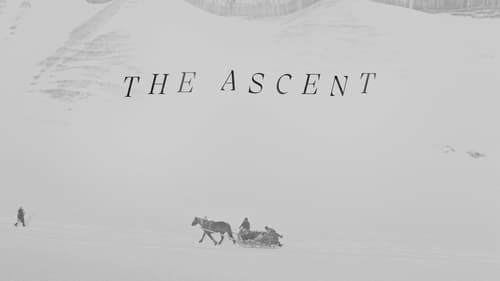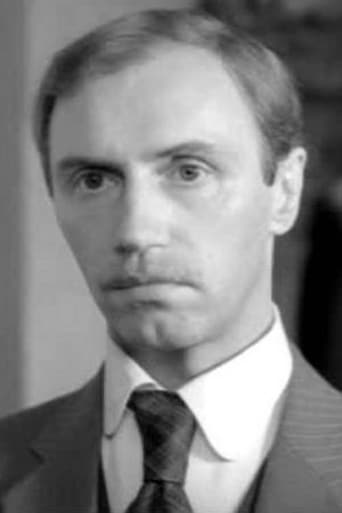Exoticalot
People are voting emotionally.
Chirphymium
It's entirely possible that sending the audience out feeling lousy was intentional
Kamila Bell
This is a coming of age storyline that you've seen in one form or another for decades. It takes a truly unique voice to make yet another one worth watching.
Philippa
All of these films share one commonality, that being a kind of emotional center that humanizes a cast of monsters.
Turfseer
The Ascent is the fourth and final feature of Soviet director Larisa Shepitko, who tragically died in a car accident at the age of 40, two years after the film's release in 1977. In many quarters, the film is hailed as a masterpiece. Given the simplicity of the story, I would be hesitant to place it in that category but it is nonetheless an impressive piece of filmmaking, with its austere black and white cinematography and great acting by all the principals concerned.The film is set during World War II in Belarus, one of the Soviet republics which was subject to the Nazi occupation. The protagonists are two partisans, Sotnikov (Boris Plotnikov) and Rybak (Vladimir Gostyukhin) who belong to a battalion consisting of both soldiers and civilians that come under fire by Germans and forced to flee into the forest in the dead of winter (the snow impacts the landscape throughout the entire narrative).Sotnikov and Rybak are ordered to find food as the battalion has run out of supplies and both troops and civilians are on the verge of starvation. The two soldiers first discover a farm they were looking for has been burnt down by the Germans and the inhabitants presumably killed. They find a house inhabited by a "headman" and his wife and conclude he's a German collaborator as he still has foodstuffs and a roof over his head. Sotnikov and Rybak take a farm animal for food but decide not to execute the headman.During an encounter with Germans, Sotnikov is shot in the leg and is severely injured. Sotnikov is on the verge of killing himself with his own shotgun but Rybak heroically drags him to another cottage, where they find a woman, Demchikha, and her three children.The action turns tragic when the Germans find the two partisans who are hiding in Demchikha's attic and arrest them along with the innocent woman and bring them in for questioning. The film ably highlights the Nazi's cruelty as they arrest Demchikha and ultimately find her guilty of being a partisan along with the two men (the children are cruelly left to fend for themselves in spite of the mother's heartrending pleas).Back at German Headquarters, Sotnikov and Rybak are interrogated by Portnov, a member of the Belarusian Auxiliary Police, another German collaborator. The film again ably notes that a good deal of the dirty work was done by locals allied with the Germans. Sotnikov ends up being tortured by Portnov and local collaborationist soldiers (a hot iron is applied to his chest) but he refuses to provide any information in regards to his batallion's position. Rybak, in contrast, tells Portnov everything he knows and is offered a chance to join the auxillary police.Meanwhile, the Headman has been accused by the Germans as being a partisan and he, along with Basya Meyer, the teen daughter of a Jewish shoemaker, end up imprisoned along with Sotnikov, Rybak and Demchikha.The film's denouement is clearly a mixed bag. Much is made of the contrast between Sotnikov, a Christ-like figure and Rybak, who is called a "Judas" to his face by a townsperson after accepting Portnov's offer to collaborate and acquiescing--watching while his comrades are executed. The reactions of the two are drawn out for maximum melodramatic effect, with Sotnikov bathed in a saintly aura as he goes to the gallows and Rybak, practically tearing his hair out with guilt over his decision to collaborate.Despite all the histrionics, Portnov and the Germans are depicted quite realistically, reacting to the entire scene as "business as usual," and confirming the old dictum of the "banality of evil." Demchikha's cries for mercy, in particular, are quite upsetting as they fall on the deaf ears of the monsters who callously ignore her pleas (her appeal is based on the face that she is the mother of three small children).The Ascent feels more like a parable than a story based on a completely real incident. The characters aren't completely fleshed out as real people but the emotions here ring true. The religious symbolism may be a bit overwrought with the contrast between courage and betrayal but the story still provides an unflinching glimpse at the power of evil men and the inability of innocents to escape their deadly clutches.
atlasmb
Set in wartime Belarus, "The Ascent" is a stark commentary on war and its effects on men and society. A ragged band of partisans is desperately trying to make their way over snow covered fields and through bleak forests, while being hunted by Nazi forces. Two of the men, Sotnikov and Rybak, are chosen to attempt a dangerous traverse of the countryside to find food. They come in contact with others who are barely hanging on to life, some who have made hard decisions about loyalty, and those who would kill them.This is a gripping story that is sometimes difficult to watch. And it asks the viewer to judge the two protagonists, who take different paths. Some see strong religious imagery in the film, but its central themes are about patriotism, which has perhaps become fetishized, and the consequence of fear. It asks the viewer to share the terrible situations of these victims of war and to decide which is a hero, if either. Director Larisa Shepitko expertly depicts people in survival mode, where there are no good choices.Because of its content, this film was not seen for about twenty years. Now it can be appreciated for its effective portrayal of war's inhumanity.
museumofdave
This intense dramatic examination of the effect of battle on two soldiers thrown together by the circumstances of World War II is brutal and often difficult to watch; it is a black and white film, and since most of the action occurs in the snow, it sometimes approaches the look of an abstract painting.In what is now Belarusa, the two men from different backgrounds are ordered to leave the camp to find food; on the way they encounter Nazi soldiers and are captured along with members of local peasantry; interrogation and torture follow. The film is less about action and more about the struggle to find meaning in battle, a struggle for the soul's integrity. This is a new release from the Criterion Eclipse series and is exquisitely remastered; be warned it is not an action film, and more a potent examination of human behavior under the worst sorts of stress; it can be a powerful viewing experience for some, and like Elem Klimov's Come And See, a revelation in many ways.
jacksflicks
I agree with another reviewer, this is such a shattering film, that will be tough to watch again soon, though for quality alone, it deserves repeated viewing. The complexity of the characters, the incredible cinematography and superb direction make this movie worth the emotional price of watching.There is one scene, of the two partisans dragging themselves through the snow to escape a patrol, that's perhaps, for sheer physicality, the most amazing performance I've ever seen. In fact, though not episodic -- the story flows -- this is a movie of memorable scenes. There's the passing of rations amongst the partisans, the snow scenes, the ruined farm scene, the encounters in the houses, the interrogation, the "basement" scene, the "ascent". All stand out like jewels in a necklace.For me, the religiosity isn't overt. Frankly, I don't think it would have been permitted in a Soviet film. I do see this as an existential parable about the value of life. Here is a tale where the hero -- and he is a true hero -- becomes the villain, and the weaker one becomes the stronger one. Is this a mystical process or one dictated by circumstances? There is a transfiguration, but does it come from within or without? You must see the movie to understand the issues, for they can't be discussed without giving away too much of the story. I can't say enough about the acting. It's hard for me to choose which of the leads is more affecting. I'm not familiar with Soviet film of the 70s and am not familiar with any of the actors, but they are all superb. I also note how director Larisa Shepitko uses children. They remind me of Giotto's child angels.There is a little muddling in the end. There is apparently a prior relationship between the soldier Sotnikov and the interrogator Portnov, but this is left dangling. And the final scene is a bit ambiguous. But compared to the total experience these are quibbles. This is a movie that will mark you for life.







